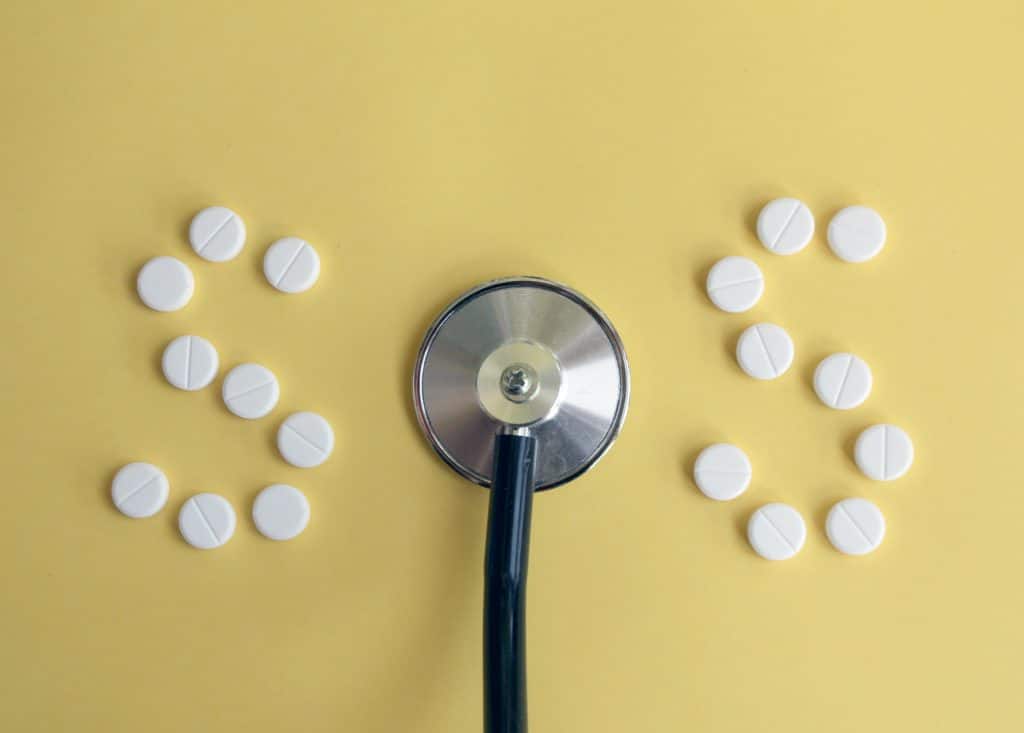What Is Trazodone?
Trazodone is an Antidepressant also known by the brand names Desyrel, Dividose, and Oleptro. It is most commonly used to treat the major depressive disorder with or without anxiety. Doctors will sometimes prescribe Trazodone off-label to treat alcohol dependence and insomnia as well. Trazodone can cause dependence, although whether Trazodone addiction is possible is debated.
Trazodone falls under the category of drugs called Selective Serotonin Reuptake Inhibitors (SSRIs), which affect the chemical balance in the brain. Serotonin is a neurotransmitter that regulates emotions, and low levels of it result in depression and other mental disorders. SSRIs such as Trazodone block the brain’s neurons from using serotonin, leaving more available to facilitate connections between neurons. More serotonin leads to a healthier and more balanced brain, relieving disorders that cause depression, anxiety, and trouble sleeping. Health practitioners will sometimes prescribe Trazodone over a sleeping Barbiturate because it is less likely to lead to addiction or cause severe side effects.
Trazodone is available in the form of 25 mg, 50 mg, 100 mg, 150 mg, and 300 mg tablets for oral ingestion. Dosage typically starts at 150 mg daily and can be increased in 50 mg increments based on a patient’s response to the medication. This prescription should be taken with food and avoided if an MAO Inhibitor has been used within the past 14 days. Trazodone is generally safe, and research has shown that it is effective in treating depression and insomnia. However, like any substance, it carries a risk for misuse, dependence, withdrawal, and overdose. Anyone who is at risk of Trazodone addiction should only use it as prescribed by health professionals.

Trazodone Addiction: Can Trazodone Be Abused?
The short answer to this question is “yes.” It appears that most any type of drug or medication can be a substance of abuse given the rather entrepreneurial nature of many who seek to abuse substances. Certain classifications of prescription medications have a higher potential for abuse than others (e.g., narcotic painkillers versus antidepressants); however, individuals who abuse prescription medications will attempt to find ways to abuse nearly any type of drug.
It has been recognized that antidepressant medications are potential drugs of abuse, although this is a relatively rare phenomenon compared to other classes of drugs, and often, antidepressant abuse occurs in conjunction with other drugs of abuse.
A 1999 study in the journal Psychopharmacology compared the abuse potential of three drugs used for sedation and anxiety control: Trazodone, Ambien, and Halcion. The potential for abuse was rated by both objective tests and the subjective experiences of former drug abusers. The findings indicated that trazodone had significantly less potential for abuse than the other two drugs; however, this can also be interpreted as meaning that trazodone does have some abuse potential although it is most likely not commonly a primary drug of abuse.
There are numerous reports on the Internet of individuals snorting trazodone, which alone would indicate that the drug is being abused because this form of administration is not consistent with medical instructions and therefore indicates these people are taking the drug for nonmedical reasons. Snorting trazodone will most likely intensify some of its sedating facts and enhance its onset of action, indicating misuse of the medication for nonmedical reasons.
Finally, trazodone has a mild potential for abuse and for the development of a mild syndrome of physical dependence that is associated with other antidepressant medications and is often termed antidepressant discontinuation syndrome. Trazodone overdoses are not very common, but they can occur.

Trazodone Addiction: Who Abuses Trazodone?
Data regarding the abuse of prescription medications as indicated by the National Institute of Drug Abuse and numerous scholarly sources regarding addiction and abuse help to define the parameters of prescription medication abuse, like trazodone addiction, such that:
- People who take prescription medications for medicinal purposes and under the supervision of a physician are far less likely to abuse these drugs.
- People who take prescription medications for nonmedical reasons are significantly more likely to develop substance use disorders and to combine them with other drugs of abuse.
- Antidepressant medication abuse more commonly occurs as a secondary drug of abuse mixed with other drugs of abuse as opposed to being a primary drug of abuse. Thus, individuals who suffer from Trazodone addiction are far more likely to also have histories of abusing other drugs or addiction to other drugs of abuse.
Any person who uses antidepressant medications for a period of greater than 6-8 weeks may potentially develop a physical dependence on the drug. Is important to note that physical dependence, while a potential symptom of a moderate to severe substance use disorder (addiction), by itself, does not indicate abuse or addiction.
Individuals who take these same medications strictly for medicinal purposes under the supervision of a physician may develop a physical dependence; however, they are not addicted or abusing them according to the formal clinical criteria for addiction and abuse (substance use disorders) as presented by the American Psychiatric Association. Addiction and abuse by definition entail the nonmedical use of drugs or substances that result in several negative consequences for the individual and lead to stress or functional impairments.

Signs of Trazodone Addiction
Signs that may indicate that an individual is suffering from trazodone addiction
- The person gets trazodone without a prescription.
- A person with or without a prescription for trazodone uses the medication more often than prescribed, more frequently than prescribed, in manners not consistent with the prescribed use of the drug (e.g., snorting it), or combines it with other drugs, such as alcohol, painkillers, etc.
- A person with a prescription attempts to get more trazodone than originally prescribed by doctor shopping, buying it illegally, stealing it, etc.
- The person begins to spend more time attempting to get or using trazodone.
- The person continues to use trazodone even though its usage leads to negative consequences, such as issues at work, issues with relationships, issues at school, etc.
- The person begins to disregard major obligations as a result of trazodone abuse, such as at work, as a parent, spouse, etc.
- The person’s drug use causes health issues.
- The person uses trazodone under potentially dangerous conditions, such as combining it with other drugs.
- The person has been using trazodone for reasons other than its intended use (e.g., to get “high” or to enhance the high experiences other drugs).
- The person begins to demonstrate issues with tolerance and withdrawal symptoms when going without the drug in the addition to displaying at least one of the above issues.
Trazodone Addiction and Dependence
Trazodone is a long-term medication. Although it is not inherently dangerous to take Trazodone for months or years, doing so may result in dependence. If a person needs to take Trazodone to feel normal, or if they feel withdrawal symptoms without it, they have become dependent.
Whether or not Antidepressants are addictive is up for debate since people do not typically crave these drugs. Regardless, people who stop taking Trazodone suddenly may experience uncomfortable withdrawal symptoms. Patients who no longer want to take this medication should talk to a healthcare provider about tapering off until it is safe to completely end treatment.
To avoid the experience of withdrawal symptoms, a person may continue to use Trazodone even if it is no longer needed. In extreme cases, those with a dependency or addiction will visit different doctors for more prescriptions or purchase it illegally. The cycle between withdrawal and relapse is characteristic of an addiction disorder, but fortunately, prescription drug addiction can be treated with detox and combination therapy at a rehab facility.

Common and Severe Side Effects
- Constipation
- Diarrhea
- Dry eyes
- Dry mouth
- Fatigue
- Muscle pains
- Memory Issues
- Nausea
- Ringing in the ears
- Trouble sleeping
- Blurred vision
- Nervousness
- Numbness
- Confusion
- Chest pain
- Difficulty breathing
- Erectile dysfunction
- Fainting
- Headache
- Lightheadedness
- Panic attack
- Rash
- Seizure
- Sweating
Trazodone Addiction: Symptoms Of Withdrawal
Trazodone withdrawal is a form of SSRI Discontinuation Syndrome (SSRIDS). Symptoms are similar to those of depression and anxiety and begin to manifest when a course of medication has been stopped abruptly.
Withdrawal symptoms are a result of changes in the brain that cause alterations to serotonin receptors. In response to Trazodone, the brain downregulates the number of receptors. When a person stops taking the drug, the decreased volume of receptors creates a short-term deficiency of serotonin activity.
The body will typically correct this on its own, but one may experience uncomfortable symptoms during an adjustment period. Experiencing withdrawals from Trazodone does not always mean a person is addicted, but it does indicate a physical dependency on the medication. Symptoms of Trazodone withdrawals may include:
- Dizziness or lightheadedness
- Nausea/Vomiting
- Shock-like sensations
- Suicidal thoughts
- Vertigo or difficulty walking
- Trouble concentrating
- Headaches
- Irritability
- Chills
- Depersonalization
To avoid withdrawal symptoms, a person should always take Trazodone as prescribed without skipping doses. If one wishes to stop or switch their medication, they should consult a medical professional and discuss options. The best way to end treatment is by using a tapering strategy under medical supervision; this strategy gradually reduces the prescribed dose until it reaches zero. Symptoms of SSRIDS can start as soon as one day after the last dosage and remain for two to three weeks.
Trazodone Addiction: Symptoms Of Overdose
It is possible to overdose on Trazodone. Overdosing on Trazodone is usually not life-threatening but can occur if someone takes too much of the medication. When too much serotonin accumulates in the body, serotonin syndrome can result. It may present with mild to severe symptoms that include:
- Rapid heart rate and high blood pressure
- Diarrhea
- Shivering and goosebumps
- Agitation or restlessness
- Twitching muscles
- Confusion
One should receive immediate medical attention if they experience:
- High fever
- Seizures
- Irregular heartbeat
- Unconsciousness
Trazodone overdose can be fatal when mixed with alcohol, Barbiturates, or Sedatives such as Valium. One should avoid drinking alcohol while taking this medication.
Treatment Options for Trazodone Addiction
Since individuals abusing trazodone are also abusing other drugs it is important to identify the context of their abuse and other drugs that may be associated with their trazodone abuse.
This will require a comprehensive assessment of the individual and the development of a treatment program that may include the following:
- Medical detox: Individuals who abuse trazodone may have developed a physical dependence on the drug. Detox can be done in either an inpatient or outpatient setting, depending on the particular circumstances involved in each individual case. Recovery from an antidepressant discontinuation syndrome typically requires physician-assisted tapering of the drug to control the withdrawal process.
- Treatment for co-occurring disorders: This includes treatment for any other addictions, substance abuse, and psychiatric/psychological disorders.
- The option for inpatient or outpatient treatment: This decision will depend on the specific details of the individual’s patterns of abuse, lifestyle, preferences, etc.
- Comprehensive therapy: This will be targeted at the initiating factors that contributed to the person’s drug abuse, the development of coping skills, a relapse prevention program, a program that addresses other potential psychological disorders/issues, and a long-term aftercare program. Therapy can be delivered in the form of individual therapy, group therapy, or both.
- A psychoeducation program: This can help clients learn about the mechanisms of addiction and how to prevent relapse.
- 12-Step meetings: These meetings can also serve as part of the individual’s long-term aftercare plan.
Reclaim Your Life From Trazodone Addiction
Trazodone Addiction is a chronic disease that can cause major health, social, and economic problems that should not be taken lightly. We Level Up California can provide you, or someone you love, the tools to recover from opiate addiction with professional and safe treatment. Feel free to call us to speak with one of our counselors. We can inform you about this condition by giving you relevant information. Our specialists know what you are going through. Please know that each call is private and confidential.